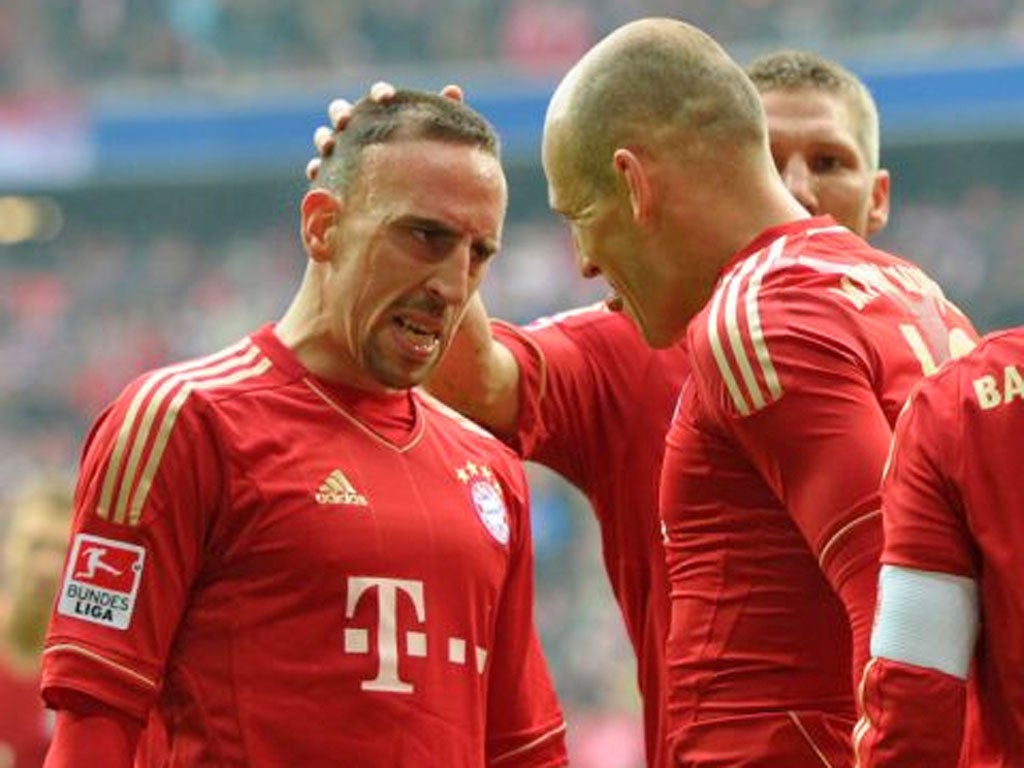Magical Bayern Munich prove Bundesliga is Europe's best league
Cheaper to attend, more adventurous tactically, and better run – what's not to like in Germany?

Chelsea’s defeat of Barcelona, and Real Madrid’s exit at the same Champions League stage, re-ignited the debate between supporters of the Premier League and La Liga over which was the best competition. The answer is neither, Europe’s best league is the Bundesliga, home of the fourth semi-finalist, Bayern Munich.
Disagree? There is no better place in Europe to be a football fan. At an average £17 the tickets are usually much cheaper than elsewhere, especially England; supporters can stand on safe terracing; they can even drink a beer while watching. The stadia are generally modern with many of the main ones redeveloped or purpose-built for the 2006 World Cup. Oh, and away fans get free rail travel into the bargain.
It is hardly surprising then that German football attracts the largest attendances in Europe despite – or perhaps because – many clubs restrict season ticket sales to share opportunity. Last season gates in Germany averaged 42,700, more than 7,000 higher than in England’s top flight. In Spain, Italy and France average gates were 25,000 or lower. This is not just the consequence of a couple of well-supported clubs such as Bayern and Borussia Dortmund (whose Yellow Wall standing terrace at the Westfalenstadion holds 26,000). Eight of the 20 best-supported teams in Europe were German, four were English.
It probably helps that supporters feel a connection to their clubs as the ‘50+1 rule’ (a minimum 51 per cent stock must be held by club members) means they cannot be owned by individuals or companies - except the historic exceptions of Wolfsburg (Volkswagen’s club) and Bayer Leverkusen (Bayer pharmacuticals). This rules out clubs finding a sugar daddy like Roman Abramovich or Sheikh Mansour, but also prevents a Portsmouth or Rangers scenario.
And what of the ‘product’? German football has come a long way from the days when every team played a sweeper and the ball was either passed methodically forward, or played early towards a Carsten Jancker-type striker. Most games are technically skilled yet fast-paced with the emphasis on attack. This is a combination of several factors. After Germany’s appalling performance at Euro 2000 the DFB (German football federation) instigated a player development programme. Jurgen Klinsmann took advantage of this to promote a cult of youth at the 2006 World Cup coupled with an adventurous style of play which has since been adopted by the likes of Hoffenheim, Mainz and champions Dortmund.
While the very best, such as Cristiano Ronaldo, still tend to move to Spain where he plays at Real Madrid alongside two of the Nationalmannshaft’s stars of the 2010 World Cup, Mesut Ozil and Sami Khedira, Bayern are a competitior to the Premier League for the next rank of players with Arjen Robben and Franck Ribery as good as anyone on these shores and Swiss starlet Xherdan Shaqiri having agreed a deal to sign for them.
Bayern are a special case. Their £160mm commercial income is twice that of all domestic competitors except Schalke 04, and greater even than Manchester United and Real Madrid – though the latter two receive larger TV income. However, the Bundesliga in general is attractive enough to retain its stars with Mario Gotze resisting Arsenal to stay with Dortmund who have also signed the latest wunderkind, Borussia Moenchengladbach’s Marco Reus. Indeed, Ozil and Khedira aside, most of Joachim Low’s national team play in Germany.
Since they cannot all play for Bayern, and even Bayern cannot buy foreign talent to the degree Manchester City or Chelsea can, the league has a competitiveness English fans will envy. Bayern have won eight of the last 14 titles, but five different clubs have been Bundesliga champions in the last nine years and a sixth, Schalke 04, have been runners-up three times. Only the French league is as competitive. Last year Bayern failed to win anything and this year they have again had to give way to Dortmund.
Success in the Champions League final, at their own ground, would be more than adequate compensation for Bayern. It would also render irrelevant the caveat which is always raised when the Bundesliga is praised, the lack of club success in Europe.
Bayern’s second final in three years is unlikely to be a blip as German clubs are extremely well placed to meet Uefa’s FFP rules due to the Bundesliga’s own strict financial regulations. They have also overtaken Italy in Uefa’s co-efficient table to have four Champions League entrants.
There is one other significant area which English fans have reason to envy their German counterparts. As well having a cheap, watchable, competitive league they also follow one of the world’s best national teams. Germany have reached the final in five of the last 11 World and European tournaments and are, as usual, among the favourites this summer.
Subscribe to Independent Premium to bookmark this article
Want to bookmark your favourite articles and stories to read or reference later? Start your Independent Premium subscription today.

Join our commenting forum
Join thought-provoking conversations, follow other Independent readers and see their replies